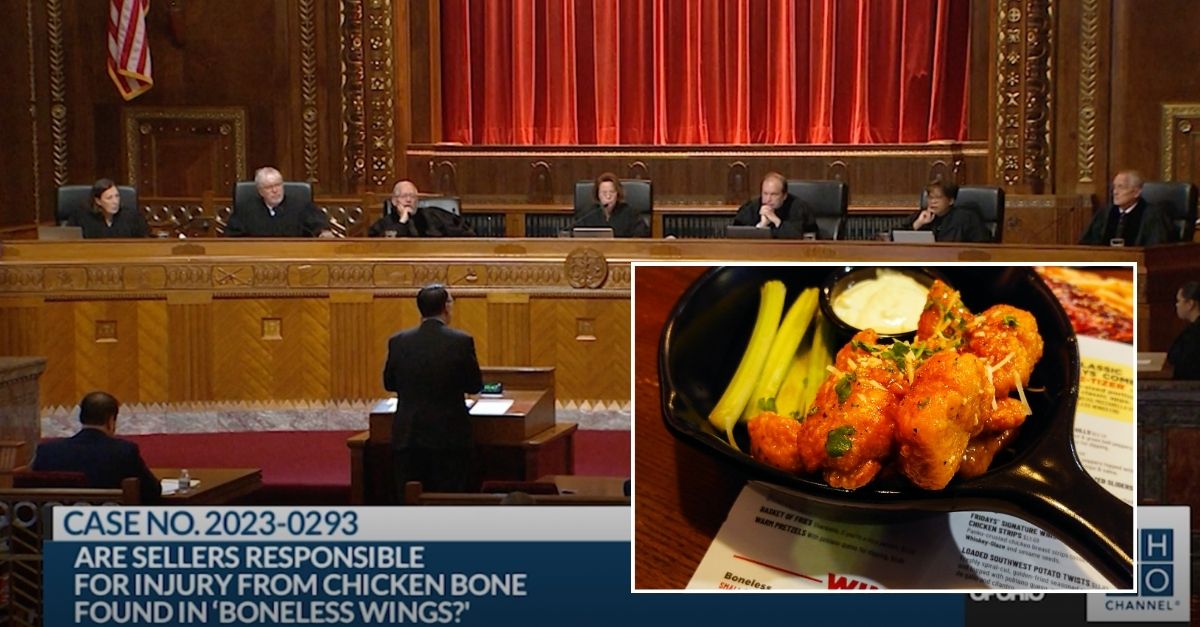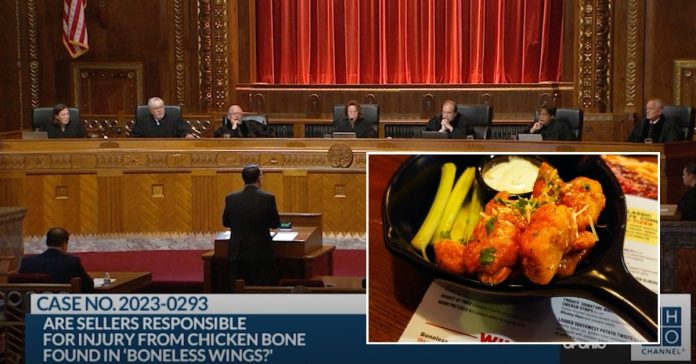
Main: The justices of the Supreme Court of Ohio consider the case of a man who choked on a chicken bone in a “boneless wing.” (Screengrab via Supreme Court of Ohio). Inset: An order of “boneless chicken wings” is shown. (AP Photo/Matt Rourke).
The highest court in Ohio is considering whether a man who got an unexpected chicken bone stuck in his esophagus can sue the restaurant who was supposed to be serving him “boneless wings.”
Michael Berkheimer, 65, was a regular at Wings on Brookwood, a restaurant in Hamilton, a suburb of Cincinnati. He ordered his usual on April 1, 2016 — boneless chicken wings with Parmesan garlic sauce. According to court filings, Berkheimer “nearly died after swallowing a chicken bone” in the wing. Berkheimer said he swallowed a piece of the wing, then hurried to the restroom where he unsuccessfully tried to vomit. Over the next few days, Berkheimer was unable to eat and had a 105-degree fever. Ultimately, a doctor surgically removed a chicken bone that had lodged in Berkheimer’s esophagus, causing a tear.
According to court filings, Berkheimer continued to suffer from related health problems, including a massive infection in his thoracic cavity requiring multiple surgeries, two medically induced comas, and multiple weeks of hospitalization. Berkheimer has said he now has long-term heart and lung damage and permanent paralysis in part of his diaphragm that significantly impacts his health and life activities.
Berkheimer sued Wings on Brookwood as well as Gordon Food Service, the food supplier, and Wayne Farms, where the chicken was processed.
Both the trial court and the appellate court ruled in favor of the defense on summary judgment. The trial judge reasoned that despite the label “boneless wings,” chicken bones are a “natural occurrence” in chicken breast that Berkheimer should have “anticipated and guarded against.” Therefore, the trial judge said, the restaurant had not been negligent and the case should be dismissed as a matter of law.
Berkheimer appealed the ruling and the Ohio Supreme Court heard oral arguments in the case Tuesday. If the court sides with Berkheimer, it would mean that the case can continue toward trial at which a finder of fact would determine whether any of the defendants are liable for damages.
Berkheimer’s attorney, Robb Stokar, argued Tuesday that labels are important and consumers should be able to rely on “boneless” wings having no bones. Stokar argued that the seller sets the expectations for what a food product contains, and that once something is labeled “boneless,” a bone should be treated as a foreign object for legal purposes.
Stokar noted that the same logic would hold true if the issue at hand were a lactose-free or gluten-free product that was later to be found containing lactose or gluten, respectively.
The justices probed Stokar on the extent to which diners should be able to rely on food names and debated at length over how “filet of fish” would fare with respect to such a rule. Stokar argued that while the term “filet” describes a boneless piece of meat, the legal ramifications of using the term “filet” are not as powerful as those resulting from the word “boneless.”
Counsel and justices traded multiple questions over the specificity of diners’ expectations of various food products.
Justice R. Patrick DeWine asked, somewhat rhetorically, “Most people know that there aren’t such things as chickens without bones out there, right? People understand that. People understand that fish have bones. So that’s a large part where their expectations come from, right?”
Attorney Patrick Byrnes, who represents Wayne Farms, argued the case for the defendants.
“It’s a chicken tender. It’s a chicken finger. It’s a chicken strip,” said Byrnes as he argued that the same product is sold all over the state under different specific names. Byrnes said that the word “boneless” in the product name should not operate as some kind of “magical warranty” that allows plaintiffs to sue without taking personal expectations into account.
Justice Melody Stewart seemed skeptical, noting, “Saying something is boneless is unequivocally clear.”
An undeterred Byrnes argued that liability should not rise and fall on whether a restaurant chooses to call chicken a “boneless wing” or a “nugget.” Such a rule would result in the word “boneless” disappearing from menus, which would in turn lead to more confusion and more litigation.
Earlier this year, a federal judge in Illinois dismissed a Chicago man’s class-action mislabeling lawsuit against Buffalo Wild Wings over the type of meat inside the boneless chicken wings. In that case, plaintiff argued that consumers misled into thinking they were getting chicken wings that had been deboned — as opposed to slices of chicken breast meat.
You can watch the full oral arguments in Berkheimer v. REKM, LLC. here.
Attorneys for the parties did not respond to request for comment by press time.
Have a tip we should know? [email protected]

